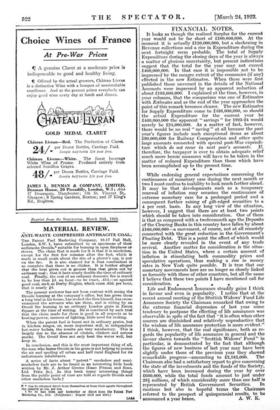FINANCIAL NOTES.
It looks as though the realized Surplus for the current year would not be far short of £100,000,000. At the moment it is actually £120,000,000, but a slackening in Revenue collections and a rise in Expenditure during the next fortnight seem probable. The total of Supply Expenditure during the closing days of the year is always a matter of glorious uncertainty, but present indications suggest that the total for the year may not exceed £460,000,000. In that ease it is impossible not to be impressed by the meagre extent of the economies (if any) effected in the new Estimates. When these were first published those unversed in the details of the National Accounts were impressed by an apparent reduction of about £105,000,000. I explained at the time, however, in your columns, that the comparison was one of Estimates with Estimates and as the end of the year approaches the point of this remark becomes clearer. The new Estimates for Supply Expenditure come to £436,000,000, so should the actual Expenditure for the current year be £460,000,000 the apparent " savings " for 1928-24 would merely be £24,000,000. As a matter of fact, however, there would be no real " saving " at all because the past year's figures include such exceptional items as about £30,000,000 for Railway Compensation and other quite large amounts connected with special post-War expendi- ture which do not recur in next year's accounts. If, therefore, the taxpayer is ever to obtain adequate relief much more heroic measures will have to be taken in the matter of reduced Expenditure than those which have been accomplished up to the present time.
While endorsing general expectations concerning the continuance of monetary ease during the next month or two I must confess to inability to look much farther ahead. It may be that developments such as a temporary renewal of inflation may occasion the continuance of extreme monetary ease for a prolonged period and a consequent further raising of gilt-edged securities to a 4 per cent. basis. In any long view of the situation, however, I suggest that there are at least two points which should be taken into consideration. One of them is that as compared with a twelvemonth ago the Deposits of the Clearing Banks in this country have fallen by about £160,000,000—a movement, of course, not at all remotely connected with the great reduction in the Government's Floating Debt. This is a point the effect of which would- be more clearly revealed in the event of any trade revival. Another matter for consideration is the situa- tion in the United States, where a certain amount of inflation is stimulating both commodity prices and speculative operations, thus making a rise in money rates in New York quite possible. It is true that our monetary movements here are no longer so closely linked as formerly with those of other countries, but all the same I believe that these two points I have mentioned call for consideration. * Life and Endowment Insurance steadily gains I think in favour and even in popularity. I notice that at the recent annual meeting of the Rottish Widows' Fund Life Assurance Society the Chairman remarked that owing to the extreme financial depression of last year some tendency to postpone the effecting of life assurances was observable in spite of the fact that "it is often when other sources are diminished and relatively unproductive that the wisdom of life assurance protection is more evident." I think, however, that the real significance, both as re- gards the popularity of life assurance in general and the- favour shown towards the "Scottish Widows' Fund" in particular, is demonstrated by the fact that although the figures of new business of last year may have been slightly under those of the previous year they showed remarkable progress—amounting to £2,185,000. The Chairman also had a satisfactory report to give concerning the state of the investments and the funds of the Society, which have been increased during the year by over £600,000, while the total funds amount to just under 28i millions, of which considerably more than one half is represented by British Government Securities. In cautious but also in hopeful terms the Chairman referred to the prospect of quinquennial results, to be


































































 Previous page
Previous page